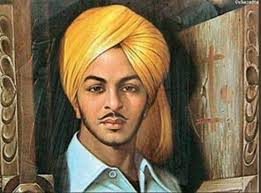
Bhagat Singh was a revolutionary freedom fighter who played a pivotal role in India’s struggle against British colonial rule. Born on September 28, 1907, in Punjab, his life was marked by an unwavering commitment to the fight against British imperialism until his martyrdom on March 23, 1931.
Early Life and Influences
Bhagat Singh was born into a family with strong nationalist sentiments. His father, Kishan Singh, and uncle, Ajit Singh, were actively involved in the freedom struggle, exposing him to revolutionary ideals from an early age. The Jallianwala Bagh massacre of 1919 deeply affected him, further fueling his resolve to fight against British rule.
Bhagat Singh was inspired by the nationalist fervor that surrounded him. The brutality of the Jallianwala Bagh massacre in 1919, where thousands of unarmed Indians were killed or injured by British forces, left a profound impact on his young mind. Witnessing such oppression convinced him that passive resistance was insufficient and that a revolutionary struggle was necessary.
Though initially drawn to Mahatma Gandhi’s non-violent movement, he later became disillusioned after Gandhi withdrew the Non-Cooperation Movement following the Chauri Chaura incident in 1922. Bhagat Singh felt that true independence required direct action, not just petitions and protests. He instead embraced radical revolutionary methods and sought inspiration from international revolutionaries such as Karl Marx, Vladimir Lenin, and Mikhail Bakunin. His belief in socialism and equality drove his vision beyond mere political independence—he wanted to create a just society free from exploitation and oppression.
Formation of Revolutionary Organizations
Determined to challenge British oppression, Bhagat Singh became actively involved in revolutionary activities. In 1926, he founded the Naujawan Bharat Sabha, an organization aimed at mobilizing youth against colonial rule and spreading nationalist ideologies. He later joined the Hindustan Republican Association (HRA), which was later renamed the Hindustan Socialist Republican Association (HSRA), emphasizing a shift towards socialist principles.
Assassination of John Saunders
One of Bhagat Singh’s most daring acts was the assassination of British police officer John Saunders on December 17, 1928. This was a response to the brutal lathi charge by the police, led by James A. Scott, which resulted in the death of nationalist leader Lala Lajpat Rai during a protest against the Simon Commission. Mistakenly identifying Saunders as Scott, Bhagat Singh, along with Shivaram Rajguru and Sukhdev Thapar, carried out the assassination as an act of retribution.
Bombing of the Central Legislative Assembly
On April 8, 1929, Bhagat Singh and Batukeshwar Dutt executed a symbolic protest by throwing non-lethal bombs inside the Central Legislative Assembly in Delhi. Their intention was not to cause harm but to make a political statement against the Public Safety Bill and Trade Disputes Bill, which were aimed at curbing civil liberties. After throwing the bombs, they voluntarily surrendered, using their trial as a platform to propagate their revolutionary ideals.
Imprisonment and Martyrdom
During his time in prison, Bhagat Singh engaged in extensive reading and wrote extensively on his vision for an independent India based on socialist principles. He also led a hunger strike in jail, demanding equal rights for Indian political prisoners.
Despite nationwide protests and appeals for clemency, Bhagat Singh, Rajguru, and Sukhdev were sentenced to death. On March 23, 1931, they were executed in Lahore Central Jail. His last words before being hanged were reportedly, “Inquilab Zindabad!” (Long live the revolution!).
Legacy and Impact
Bhagat Singh’s legacy extends beyond his revolutionary actions. His writings, including “Why I Am an Atheist,” and his belief in socialism, nationalism, and equality continue to inspire generations. His fearlessness, commitment to justice, and progressive ideology make him an enduring symbol of resistance against oppression.
His famous words, “They may kill me, but they cannot kill my ideas. They can crush my body, but they will not be able to crush my spirit,” reflect his undying belief in the power of revolutionary thought.
Every year, March 23 is observed as Shaheed Diwas (Martyrs’ Day) to honor his sacrifice. Bhagat Singh remains an icon of courage, selflessness, and unwavering patriotism, influencing not just India’s independence movement but also contemporary struggles for justice and human rights.
His life serves as a reminder that the fight for justice requires both intellect and action, making Bhagat Singh one of the most revered figures in India’s history.
REFERENCE LINKS AND BOOKS : –
- Wikipedia: Bhagat Singh
- The Life and Time of Bhagat Singh